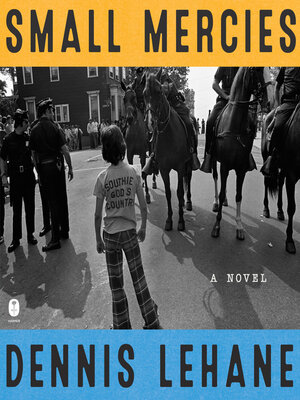
Mary Pat Fennessy just wants to find her daughter. It’s 1974, and life is hard in the grinding poverty of South Boston’s housing projects. She’s buried both her first husband and her son, who fought in Vietnam but came home to Southie to overdose on heroin. Her beloved second husband left her, and now her sole remaining child, her 17-year-old daughter Jules, has not come home from a night out with friends. That same night a young, Black man was found dead in a Southie subway station, apparently hit by a train.
Mary Pat knows whom to talk to, who’s connected to whom. Her search takes her into the inner circle of Southie’s Irish mob, run by Marty Butler. They’ve known each other for years—everyone knows everyone in this tight enclave—and he advises her to let it go lest she bring the attention of the authorities down on his activities. One of his lieutenants explains that Jules has probably gone to Florida, which reminded me that the film Midnight Cowboy had come out only five years earlier, though it isn’t mentioned in the book.
This mostly Irish-American neighborhood may be Mary Pat’s world, the only one she’s known, but the outside world makes itself felt. There’s Vietnam and the heroin epidemic. There’s Nixon’s resignation and the recession caused by the oil embargo among other things. Most of all, there’s Judge Garrity’s order to desegregate Boston’s schools by busing children to schools outside their neighborhoods.
Boston exploded. I was living nearby and well aware of the uproar, though several members of my book club only read about it later. Lehane takes us inside one of its hotbeds: Southie, where residents—mostly the women—rose up in protest. The casual racism and racist epithets may seem incredible to those who were not around then, but they were common enough, not just in South Boston but most other places as well—certainly in the city where I grew up—though more often in private conversations than yelled on the streets.
By laying bare the web of connections between the characters, going back to childhood, and the insistent demands to conform to the neighborhood’s customs, Lehane shows how difficult it is to go against your tribe. You risk losing everything, even the little that you have. Once one of the leaders of the protests, Mary Pat is now only concerned about her daughter. The more she discovers the circumstances of Jules’s disappearance, the more she finds herself in conflict with the mob and her former friends.
What most fascinated me were the tiny, incremental changes in the characters. Not epiphanies or redemptive realisations, but rather the slightest doubt, the whisper of a question. Is what I’ve been taught and believed all my life actually true? Did I miss an important piece of information somewhere along the way? Questions all of us might find it useful to ask ourselves now and then.
It’s easy to look back, and in our self-righteousness call the crowds protesting integration ignorant, but Lehane enables us to see their point of view. I also loved the way Lehane, who grew up in neighboring Dorchester, slips in the little social codes of that time and place, such as that a man didn’t curse in front of a woman he doesn’t know, no matter what foul language she dishes out to him.
Some people in my book club thought Mary Pat was unrealistic. One called her “almost Wonder Woman.” But I’ve known women like Mary Pat who, hardened by life’s blows, have learned to fight back and win. They’ve learned timidity doesn’t work; you have to raise your voice and demand what you need.
This is a cracking good read, as you’d expect if you’ve read other Lehane novels. Like me, you’ll find it hard to tear yourself away. When you do, still thinking about Mary Pat and Jules and the other characters, you’ll find their story gives you a context for today’s news, a more accurate picture of the past instead of the fairy tale some people would like you to believe.
What’s your favorite Dennis Lehane novel?